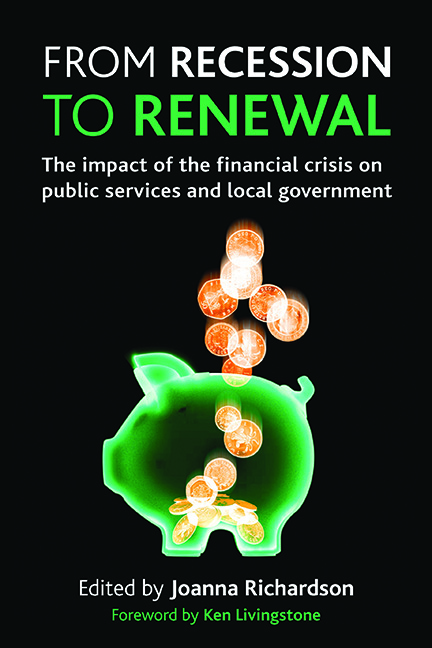 From Recession to Renewal
From Recession to Renewal six - Exploring the local political context of the recession
Published online by Cambridge University Press: 01 September 2022
Summary
Introduction
Local authorities across the country have been dealing with the first budget process in which the impact of the recession has played a major influence. Not that previous years have been easy; there has since 2004 been an expectation, following Sir Peter Gershon's report, that authorities would be able to identify considerable economies on a year-by-year basis, primarily through increasing use of IT, especially in back-office functions. For the past few years, grant settlements have built in this expectation and, given the problems of raising additional revenue from council tax (a 1% increase in revenue expenditure typically requires a 4% increase in council tax), it is not surprising that authorities have had to focus on identifying savings rather than funding new initiatives. However, the challenges facing them in setting budgets for 2010–11 have been on a different scale. Furthermore, whereas in the past council actors have been able to use their room for manoeuvre in the local context to protect at least one of the holy trinity of staffing, services and council tax, many now are already bringing forward proposals for a ‘triple whammy’.
It is clear that the situation is going to get much worse before it gets better. Even if Britain avoids a ‘double-dip’ recession following cuts in 2010, a prospect which seems at best uncertain, it is hard to see a plausible scenario in which public expenditure, including that of local authorities, is not cut every year, primarily to respond to the costs incurred by the government in bailing out the banks in 2009. Four or five increasingly lean years, probably up to 2014–15, is a widespread expectation.
How will local councils respond to this gloomy prospect? In the national media and the political discourse of Westminster the focus is on cuts to public services, with a widespread assumption that local authorities will follow central government's lead in terms of protecting ‘front-line’ services and wielding the axe to every other department and function. This in turn would imply that the resources previously committed to so-called ‘soft’ initiatives such as community leadership will be one of the first targets for local councillors and, as a result, may all but disappear.
- Type
- Chapter
- Information
- From Recession to RenewalThe Impact of the Financial Crisis on Public Services and Local Government, pp. 111 - 134Publisher: Bristol University PressPrint publication year: 2010


